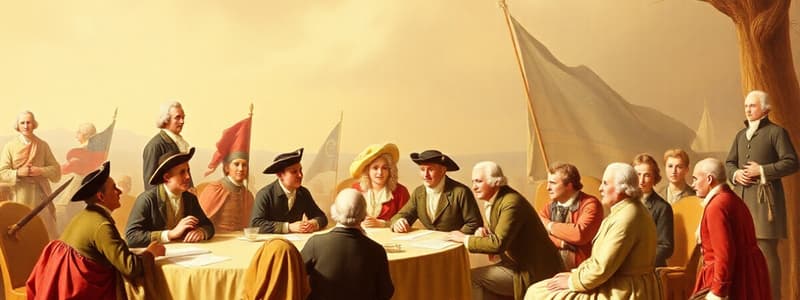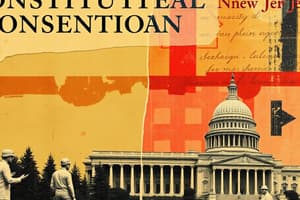Podcast
Questions and Answers
Match each plan from the Constitutional Convention with its description:
Match each plan from the Constitutional Convention with its description:
New Jersey Plan = One-house legislature Virginia Plan = Equal representation for each state
Match each characteristic with the correct plan proposed during the Constitutional Convention:
Match each characteristic with the correct plan proposed during the Constitutional Convention:
One-house legislature = Virginia Plan Equal votes for each state = New Jersey Plan Favoring big states = New Jersey Plan Representation based on population = Virginia Plan
Match the following features with the correct plan discussed at the Constitutional Convention:
Match the following features with the correct plan discussed at the Constitutional Convention:
New Jersey Plan = Representation based on each state getting equal votes Virginia Plan = Two-house legislature
Match each plan with whether it favors large or small states:
Match each plan with whether it favors large or small states:
Match each plan with its legislature structure:
Match each plan with its legislature structure:
Match the terms of the Treaty of Paris with their corresponding descriptions:
Match the terms of the Treaty of Paris with their corresponding descriptions:
Match the parties involved in the Treaty of Paris with their roles:
Match the parties involved in the Treaty of Paris with their roles:
Match the following outcomes with their descriptions regarding the Declaration of Independence (DOI):
Match the following outcomes with their descriptions regarding the Declaration of Independence (DOI):
Match the outcomes of the Treaty of Paris with their significance:
Match the outcomes of the Treaty of Paris with their significance:
Match the following terms related to the DOI with their implications:
Match the following terms related to the DOI with their implications:
Match the phrases related to the Treaty of Paris with their implications:
Match the phrases related to the Treaty of Paris with their implications:
Match the key concepts of the Treaty of Paris with their definitions:
Match the key concepts of the Treaty of Paris with their definitions:
Match the following aspects of the DOI with their consequences:
Match the following aspects of the DOI with their consequences:
Match the following outcomes of signing the DOI with their potential fallout:
Match the following outcomes of signing the DOI with their potential fallout:
Match the following concepts related to the DOI with their potential scenarios:
Match the following concepts related to the DOI with their potential scenarios:
Match the following historical documents with their main contributions:
Match the following historical documents with their main contributions:
Match the following terms with their definitions:
Match the following terms with their definitions:
Match the following U.S. historical periods with their characteristics:
Match the following U.S. historical periods with their characteristics:
Match the following key figures with their roles during the founding of the United States:
Match the following key figures with their roles during the founding of the United States:
Match the following notable events with their effects:
Match the following notable events with their effects:
Match the following compromises with their descriptions:
Match the following compromises with their descriptions:
Match the following outcomes with their historical context:
Match the following outcomes with their historical context:
Match the following beliefs with either Federalists or Anti-Federalists:
Match the following beliefs with either Federalists or Anti-Federalists:
Match the following terms with their relevance:
Match the following terms with their relevance:
Match the following descriptions with Federalists or Anti-Federalists:
Match the following descriptions with Federalists or Anti-Federalists:
Match the following statements about government structure with Federalists or Anti-Federalists:
Match the following statements about government structure with Federalists or Anti-Federalists:
Match the following concepts with their significance:
Match the following concepts with their significance:
Match the following compromises with their implications:
Match the following compromises with their implications:
Match the following historical figures with their influence on these compromises:
Match the following historical figures with their influence on these compromises:
Match the following goals to Federalists or Anti-Federalists:
Match the following goals to Federalists or Anti-Federalists:
Match the following historical facts with their context:
Match the following historical facts with their context:
Match the following motivations with Federalists or Anti-Federalists:
Match the following motivations with Federalists or Anti-Federalists:
Match the following elements of the Electoral College with their roles:
Match the following elements of the Electoral College with their roles:
Match the following phrases with their meanings:
Match the following phrases with their meanings:
Match the weaknesses of the Articles of Confederation with their descriptions:
Match the weaknesses of the Articles of Confederation with their descriptions:
Match the weaknesses of the Articles of Confederation with their consequences:
Match the weaknesses of the Articles of Confederation with their consequences:
Match the specific weaknesses of the Articles of Confederation with related historical facts:
Match the specific weaknesses of the Articles of Confederation with related historical facts:
Match each term with its relation to the weaknesses of the Articles of Confederation:
Match each term with its relation to the weaknesses of the Articles of Confederation:
Match the weakness with its impact on governance during the Articles of Confederation period:
Match the weakness with its impact on governance during the Articles of Confederation period:
Match the components of the Northwest Ordinance with their significance:
Match the components of the Northwest Ordinance with their significance:
Match the plans discussed at the Constitutional Convention with their features:
Match the plans discussed at the Constitutional Convention with their features:
Match the success of the Northwest Ordinance with its outcomes:
Match the success of the Northwest Ordinance with its outcomes:
Match the slide numbers with their corresponding content:
Match the slide numbers with their corresponding content:
Match the following Revolutionary War battles with their significance:
Match the following Revolutionary War battles with their significance:
Match the significance of Revolutionary War battles with the corresponding battle:
Match the significance of Revolutionary War battles with the corresponding battle:
Match the Revolutionary War battle with its outcome:
Match the Revolutionary War battle with its outcome:
Match the following battles with their historical quotes:
Match the following battles with their historical quotes:
Match the battle with the allied support received:
Match the battle with the allied support received:
Flashcards
Articles' Weakness: No Power to Tax
Articles' Weakness: No Power to Tax
The central government under the Articles of Confederation lacked the authority to impose taxes.
Articles' Weakness: States Didn't Contribute Money
Articles' Weakness: States Didn't Contribute Money
Under the Articles, the states were reluctant to share their money with the central government, making it difficult to fund operations.
Articles' Weakness: Difficulty Passing Laws
Articles' Weakness: Difficulty Passing Laws
The process of passing laws under the Articles of Confederation was complex, leading to frequent disagreements and stalled decision-making.
Articles' Weakness: No Standing Army
Articles' Weakness: No Standing Army
Signup and view all the flashcards
Weaknesses of the Articles of Confederation
Weaknesses of the Articles of Confederation
Signup and view all the flashcards
Consequences of signing the Declaration
Consequences of signing the Declaration
Signup and view all the flashcards
Treaty of Paris
Treaty of Paris
Signup and view all the flashcards
Effects of the Declaration
Effects of the Declaration
Signup and view all the flashcards
British Recognition of American Independence
British Recognition of American Independence
Signup and view all the flashcards
Risks of signing the Declaration
Risks of signing the Declaration
Signup and view all the flashcards
What is treason?
What is treason?
Signup and view all the flashcards
Return of Loyalist Property
Return of Loyalist Property
Signup and view all the flashcards
Impact of Treaty of Paris
Impact of Treaty of Paris
Signup and view all the flashcards
What was the colonists' aim when signing the Declaration?
What was the colonists' aim when signing the Declaration?
Signup and view all the flashcards
Significance of the Treaty of Paris
Significance of the Treaty of Paris
Signup and view all the flashcards
Lexington and Concord
Lexington and Concord
Signup and view all the flashcards
Saratoga
Saratoga
Signup and view all the flashcards
Trenton and Princeton
Trenton and Princeton
Signup and view all the flashcards
Yorktown
Yorktown
Signup and view all the flashcards
Key Battles of the American Revolution
Key Battles of the American Revolution
Signup and view all the flashcards
New Jersey Plan
New Jersey Plan
Signup and view all the flashcards
Virginia Plan
Virginia Plan
Signup and view all the flashcards
Compromise of the Constitutional Convention
Compromise of the Constitutional Convention
Signup and view all the flashcards
The Great Compromise
The Great Compromise
Signup and view all the flashcards
States' Rights
States' Rights
Signup and view all the flashcards
Great Compromise
Great Compromise
Signup and view all the flashcards
Three-Fifths Compromise
Three-Fifths Compromise
Signup and view all the flashcards
Bicameral Legislature
Bicameral Legislature
Signup and view all the flashcards
House of Representatives
House of Representatives
Signup and view all the flashcards
Senate
Senate
Signup and view all the flashcards
What is the Electoral College?
What is the Electoral College?
Signup and view all the flashcards
How many electors does each state get?
How many electors does each state get?
Signup and view all the flashcards
How many votes are needed to win the presidency through the Electoral College?
How many votes are needed to win the presidency through the Electoral College?
Signup and view all the flashcards
Why was the Electoral College created?
Why was the Electoral College created?
Signup and view all the flashcards
What is a criticism of the Electoral College?
What is a criticism of the Electoral College?
Signup and view all the flashcards
Northwest Ordinance of 1787
Northwest Ordinance of 1787
Signup and view all the flashcards
Articles of Confederation
Articles of Confederation
Signup and view all the flashcards
Treaty of Paris (1783)
Treaty of Paris (1783)
Signup and view all the flashcards
What was significant about the Northwest Ordinance?
What was significant about the Northwest Ordinance?
Signup and view all the flashcards
What were some challenges to the Northwest Ordinance?
What were some challenges to the Northwest Ordinance?
Signup and view all the flashcards
Federalists
Federalists
Signup and view all the flashcards
Anti-Federalists
Anti-Federalists
Signup and view all the flashcards
US Constitution
US Constitution
Signup and view all the flashcards
Bill of Rights
Bill of Rights
Signup and view all the flashcards
Northwest Ordinance: A Success under the Articles?
Northwest Ordinance: A Success under the Articles?
Signup and view all the flashcards
What was the New Jersey Plan?
What was the New Jersey Plan?
Signup and view all the flashcards
What was the Virginia Plan?
What was the Virginia Plan?
Signup and view all the flashcards
What was the Constitutional Convention?
What was the Constitutional Convention?
Signup and view all the flashcards
What were the compromises of the Constitutional Convention?
What were the compromises of the Constitutional Convention?
Signup and view all the flashcards
Study Notes
Treaty of Paris
- Forced the British to accept independence of the colonies
- Americans agreed to return Loyalists property (This did not happen)
Studying That Suits You
Use AI to generate personalized quizzes and flashcards to suit your learning preferences.




